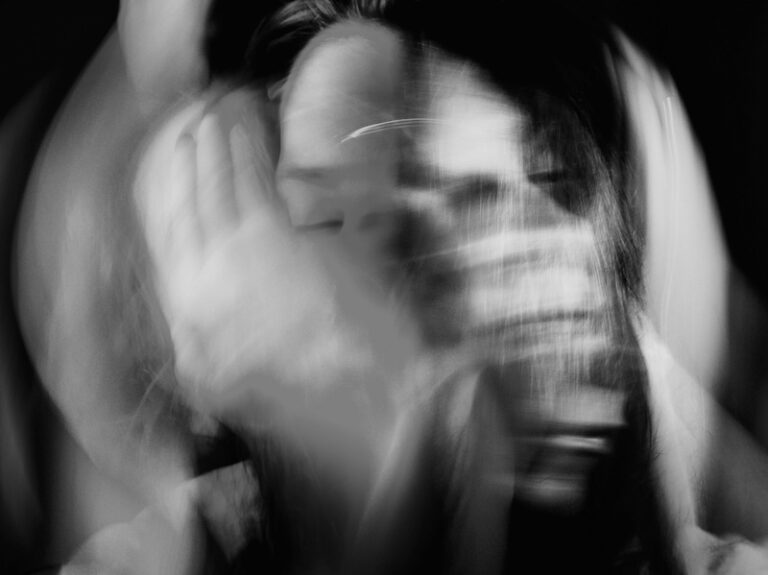

Are you one of those lucky ladies who can predict when their period is going to hit based on the insomnia that strikes a week or so before you actually start bleeding?
You’re not alone! It’s more common than you think.
In fact, the National Sleep Foundation found that 23 percent of women report disrupted sleep in the week before their periods, and a full 30 percent report disrupted sleep during them.
Ready for some good news?
You can naturally cure that PMS-related insomnia!
Most women need at least 7.5 hours of restorative sleep each night, some people require more, some less, and it can often fluctuate depending on what’s going on in your life.
Your sleep quality is determined by how long you sleep, how deeply you sleep, and how easily you wake up.
When your sleep quality is good, you tend to feel well rested, refreshed, and more capable of managing your day.
Poor quality sleep can make you tired and irritable and can negatively affect your concentration and memory.
Changing hormone levels during the menstrual cycle has a direct impact on your sleep quality.
The menstrual cycle is made up of two cycles that interact and overlap: one cycle happens in the ovaries, and one cycle happens in the uterus.
The brain, ovaries, and uterus work together and communicate through hormones — chemical signals sent through the blood from one part of the body to another — to keep the cycle going.
A menstrual cycle starts with the first day of bleeding and ends with the start of the next bleed. A typical cycle is approximately 24 to 35 days (average 28 days for most women). It is not abnormal for a woman’s cycle to occasionally be shorter or longer.
Cycle length changes between menarche — when your periods first start during puberty — and menopause, when your periods stop permanently.

Follicle Stimulating Hormone (FSH) is released from the pituitary gland in the first half of the cycle and stimulates the ovarian follicles (that contain the eggs) to mature.
Luteinizing Hormone (LH) is released from the pituitary gland at ovulation and triggers the rupture of the mature ovarian follicle, releasing the egg (known as ovulation).
Estrogen is a female sex hormone that is responsible for growing and maturing the uterine lining that is shed during menstruation, and also maturing the egg prior to ovulation. Estrogen is mainly produced by the ovaries, but also in smaller amounts by the adrenal glands and fat cells.
Progesterone is another female sex hormone that works in the body to balance the effects of estrogen. It controls the build up of the uterine lining and helps mature and maintain the uterine lining and the viability of the fertilized embryo, if conception occurs. If there is no pregnancy, progesterone levels fall triggering the lining of the uterus to shed, beginning the next menstrual cycle.
Testosterone is an important sex hormone for both men and women, although women have much lower levels. It’s produced by the ovaries and adrenal glands, it surges at ovulation. Testosterone helps women maintain muscle mass and bone strength, enhances sex drive, and helps with overall sense of well-being.
The first half of the cycle is known as the follicular phase. The second half is considered the luteal phase. Midway through the cycle – between days 12 and 18 – ovulation occurs, known as the ovulatory phase.
Follicular phase: signals from the brain tell the ovaries to prepare an egg that will be released at ovulation, your estrogen surges.
Ovulatory phase: an egg is released from the ovary into the fallopian tube, your estrogen levels peak and triggers a release of luteinizing hormone (LH).
Luteal phase: if conception doesn’t occur, the follicle that released the egg becomes a corpus luteum — a temporary gland that releases massive amounts of progesterone. Your estrogen dips, your progesterone spikes, and your body stops producing the follicle stimulating hormone (FSH).
Now that we know how the menstrual cycle works, let’s dig into why insomnia occurs shortly before your period.
This shouldn’t come as a huge surprise, but PMS symptoms are directly related to the ebbs and flows of fluctuating hormones during your menstrual cycle.
The week before your period — the luteal phase — is generally when PMS hits.
During the luteal phase, you have a big surge and then a rapid decline in estrogen and progesterone. When your estrogen and progesterone are balanced — like yin and yang — this rise and fall shouldn’t trigger any symptoms.
BUT
When you have too much estrogen, and not enough progesterone — commonly known as Estrogen Dominance — you can experience PMS symptoms, including insomnia. Estrogen dominance is triggered by a long list of common factors, including stress, lack of self-care, poor diet, sedentary lifestyle, and exposure to environmental toxins.
This hormone imbalance is made worse if your progesterone levels are low overall — which can affect women of every age, but it occurs more often to women over age 35. That’s because overall progesterone levels start trending downward during perimenopause, and lower progesterone negatively impacts the production of melatonin — a hormone that is required to fall asleep and stay asleep.
Progesterone is also linked to both an increase in body temperature and fatigue, which are two classic symptoms of premenstrual syndrome (PMS). This is why you may feel exhausted but have trouble sleeping in the days leading up to your period. A drop in body temperature signals that it’s time to sleep. If your hormones are keeping you warmer than normal, it’s harder to naturally drift off.
To read more about Estrogen Dominance, check out this blog post: Natural Remedies for Estrogen Dominance.
Do you ever get that “tired-but-wired” feeling, where you are so completely exhausted, but can’t fall asleep? That’s directly related to adrenal fatigue — where prolonged exposure to stress drains the adrenals, leading to a low cortisol state. Chronic stress has negative effects on almost every element of your physical and mental health, but it’s particularly debilitating when it comes to sleep.
Another common cause of PMS-related insomnia is micronutrient deficiencies. Low levels of magnesium, zinc, and/or selenium can make a deep slumber harder to come by. Magnesium helps promote relaxation; selenium helps boost progesterone and bring your reproductive hormones back into balance; and studies show that zinc can help improve sleep quantity and quality.
You wanna know what else has a negative effect on sleep? Caffeine and alcohol. If you’re struggling to get a good night’s sleep, try cutting out (or at least significantly decreasing) your caffeine and alcohol consumption.

Here’s where I give you a few of my favorite long-term strategies for better sleep and for saying goodbye to insomnia the week before your period, but before I do, a quick disclaimer:
These tips and tricks aren’t going to change your life (and sleep patterns) overnight. It’s always a process, and your patience will pay off.
Yep, seriously. It’s not easy, I know. Your hormones will thank you for eliminating coffee, caffeinated teas, and alcohol. Trust me.
Another one that’s easier said than done, I know. The world is chaotic, and that’s not going to just right itself. Control what you can. Ashwagandha — an adaptogenic herb — supports adrenal glands and helps modulate your stress response.
Taking a high-quality vitamin B6 supplement can help boost your progesterone levels, and so can Vitex — an herb has been used for centuries to support hormone health.
But the best way to increase your progesterone is by using bio identical progesterone. You can read all about how to do this in my blog post titled ‘Using Bioidentical Progesterone to Naturally Increase Progesterone Levels‘.
As you enter the second half of your 28-day menstrual cycle, you have much more estrogen circulating in your body, and what you eat can help your body metabolize that extra estrogen more efficiently.
Cruciferous vegetables — broccoli, cauliflower, Brussels sprouts, cabbage, bok choy, and watercress — are especially important for estrogen detox during this phase.
The more effectively your body handles estrogen during the second half of your cycle, the easier it will be to fall asleep.
Is there anything an orgasm can’t cure?! Alone or with a partner, orgasms are great for promoting relaxation, relieving PMS-induced cramps, and encouraging a restful sleep.
create a bedtime ritual
Reserve at least 30 minutes to transition to bedtime. A relaxing ritual before you climb into bed will make a difference — whether it’s a warm bath, 30 minutes of screen-free reading, or a yoga nidra practice — your body (and mind!) will thank you.
avoid blue light at night
The light emitted by your computer, tablet, and phone screen inhibits the body’s production of melatonin and interferes with sleep. Invest in a pair of blue light-blocking glasses or, better yet, skip screens all together for at least an hour before bed.
prepare your bedroom
Sleep in complete darkness, 68F or cooler, get an eye mask, get rid of the electronics from your bedroom, and use your bed to, well, SLEEP. Aim for at least 8 hours minimum. Deeply, restoratively, soundly.
The Problem: Your body temperature rises over the course of your menstrual cycle.
The Cause: Your core body temperature rises between a half and a whole degree during your period. This can be a problem because an evening drop in body temperature is one of the main biological triggers that makes you feel sleepy.
The Solution: Make sure your bedroom is cooled to optimal sleeping temperature: about 60-67 degrees Fahrenheit. Trick your body into drowsiness with a warm bath or shower, because moving from warm water to your cool bedroom will make your body temperature drop. And consider sleeping with fewer covers.
The Problem: Mood swings make you feel anxious or depressed.
The Cause: Period-related mood swings are very normal; hormones like estrogen and progesterone drop right before your period, making you experience negative emotions more strongly. And anxiety and depression make it tough to fall asleep at night.
The Solution: First, just being aware that some of your mood swings can be attributed to hormones can help ease the problem, by untangling your mind-body matrix. Consider tracking your period with an app or on a calendar. During your period itself, you can try deep breathing, meditation or yoga to relax and unwind before bedtime.
The Problem: Stomach issues make it tough to fall or stay asleep.
The Cause: You may have noticed digestive upsets during menstruation such as indigestion, nausea or diarrhea – all of which are related to fluctuating hormones.
The Solution: Although you may be tempted by comfort foods, avoid heavy meals and snacking before bedtime.
The Problem: Cramps, headaches and muscle pain can make it hard to get comfortable.
The Cause: Hormones, duh.
The Solution: Try changing your sleep position, adding or subtracting pillows, or using a heating pad to relieve pressure.

PMS-related insomnia is REAL. The National Sleep Foundation found that 23 percent of women report disrupted sleep in the week before their periods, and a full 30 percent report disrupted sleep during them.
Low progesterone levels play a huge role in your ability to sleep during the week leading up to your period.
You don’t have to suffer from PMS-related insomnia! I have a handful of natural remedies to help you get a get night’s sleep, regardless of where you’re at in your menstrual cycle.
Hormones. Specifically, a progesterone and estrogen imbalance.
Some micronutrient deficiencies can also cause insomnia, as well as caffeine and alcohol consumption too close to bedtime.
Do you ever get that “tired-but-wired” feeling, where you are so completely exhausted, but can’t fall asleep? That’s directly related to adrenal fatigue — where prolonged exposure to stress drains the adrenals, leading to a low cortisol state. Chronic stress has negative effects on almost every element of your physical and mental health, but it’s particularly debilitating when it comes to sleep.
So many things! Here are a few of my natural remedies to encourage sleep: boost your micronutrients, eliminate caffeine and alcohol, manage your stress, boost your progesterone, eat to detox excess estrogen, orgasm, and uplevel your sleep hygiene.
The Fertility Code is the best-kept secret of women who want to take the guesswork out of conceiving, and give themselves every possible chance of getting, and staying, pregnant successfully.
Bringing together a personalized & custom approach, evidence-based information, science-backed protocols, and nurturing practices, this course is for anyone who is struggling to get pregnant, or thinking about getting pregnant soon. The course is a one-stop-shop for getting your body, mind and soul prepared for conception.
In less than 3 months, you will learn exactly what you need to do now to get pregnant successfully and have a healthy full term pregnancy with The Fertility Code.
Sarah Jane Sandy is a certified nutrition therapist, and a fertility and women’s health expert. She has helped hundreds of women increase their fertility naturally and go on to have healthy full-term pregnancies. She has been working with women and couples trying to get pregnant for over 16 years and over 90% of the women who work with her get pregnant and have healthy babies.
She also works with women trying to fix their hormone imbalances, as well as supporting women through pregnancy and the postpartum period. Learn more about her own fertility and hormone journey here. To send Sarah a message, complete her Contact Form.



© 2026 Sarah Jane Sandy. All rights reserved. Privacy Policy | Terms and Conditions |
Medical Disclaimer

Curious about your fertility health? Take this simple quiz to find out what factors may be harming your fertility, and learn what you can do about it!